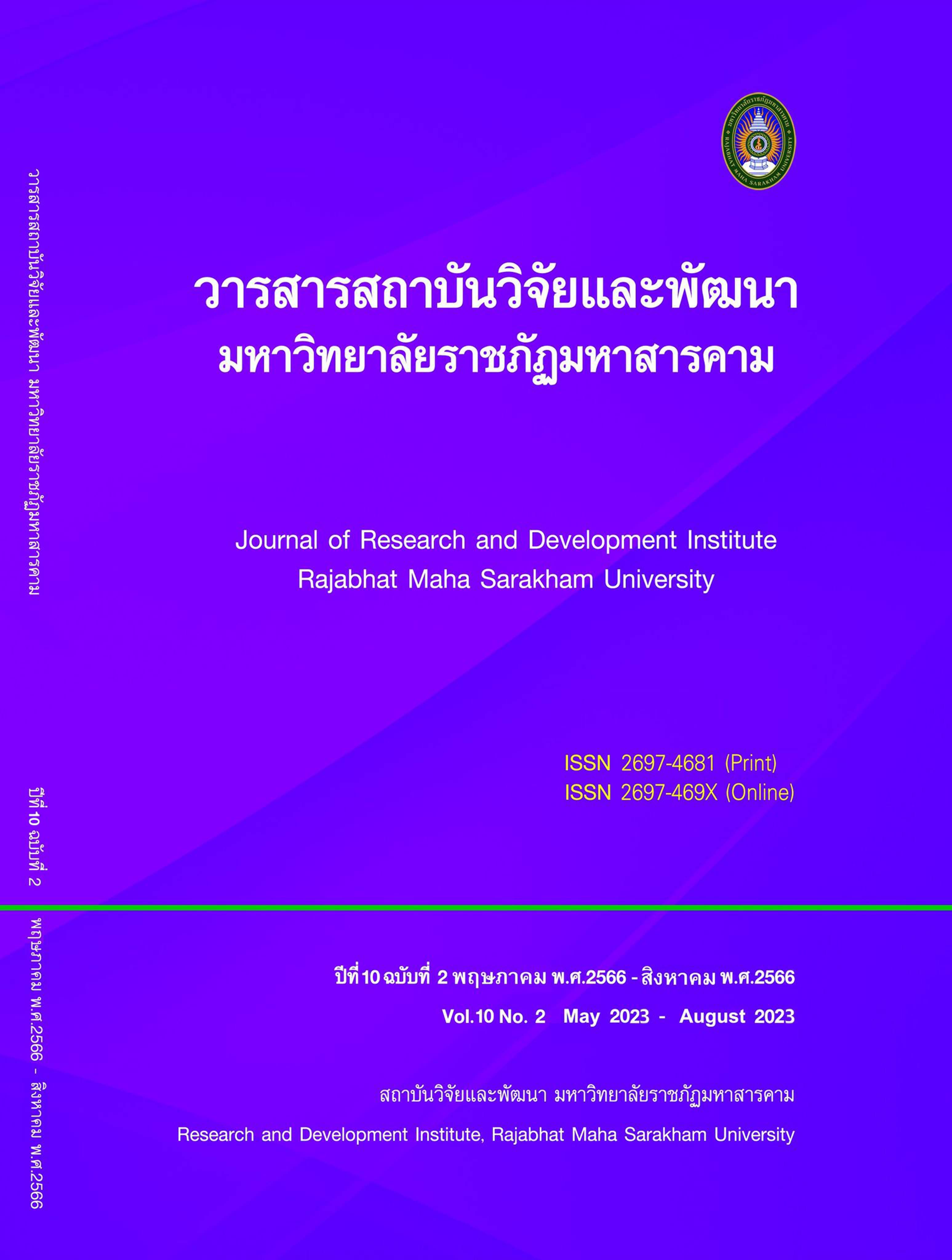Development of Indicators and Criteria for Assessing the Competency of Experience 21st Century Learning for Caregivers in Child Development Centers under the Local Government Organization
Keywords:
Indicators and assessment criteria, experience organizing competence, 21st century learning, Child development centersAbstract
The purposes aims to : (1) Study the results of the indicators and criteria for assessing the competency of experience 21st century learning for caregivers in child development centers. (2) study the appropriateness suitability, possibility, accuracy, and usefulness of indicators and criteria for assessing the competency of experience 21st century learning for caregivers in child development centers. The tools used were suitability, possibility, accuracy, and usefulness of indicators and criteria. The sample group consisted of 800 people involved in the assessment in the Roi-Kaen-Sarasin Province group. The statistics used were average and percentage.
The research results were found that :
(1) The development of the indicators and criteria for assessing the competency of experience 21st century learning for caregivers in child development centers can be summarized as follows:
1.1) the indicators and criteria for assessing the competency of experience 21st century learning for caregivers in child development centers had 6 main indicators and 19 sub-indicators be summarized as follows: 1) Curriculum comprehension consists of 4 sub-indicators, 2) analyzes learners, consisting of 3 sub-indicators, 3) The arrangement of student-centered experiences consists of 4 sub-indicators, 4) The use of media for student development consists of 2 sub-indicators, 5) Assessment of learner's development according to actual conditions consists of 4 sub-indicators, and 6) classroom research consisting of 2 sub-indicators.
1.2) The results of the synthesis of criteria for assessing the competency of experience 21st century learning for caregivers in child development centers be summarized as follows:
1.2.1) Criteria for judging the results of the assessment
The percentage of scores 1 – 59 means: The learning experience competency is at an improvement level.
The percentage of scores 60 – 69 means: The learning experience competency is at a fair level.
The percentage of scores 70 – 79 means: The learning experience competency is at a good level.
The percentage of scores 80 – 89 means: that the learning experience competency is at a very good level.
The percentage of scores 90 – 100 means: The learning experience competency is at an excellent level.
(2) Results of suitability, possibility, accuracy, and usefulness of indicators and criteria for assessing the competency of experience 21st century learning for caregivers in child development centers, Overall was at the highest level.
References
Buason, R. (2007). Direction and area of assessment. (2nded). Bangkok: V. Print.
Bureau of the Education Testing. (2011). The quality assessment standards kindergarten education for quality assurance in school. Bangkok: Krusapa Printer.
Iamprasert, P. (2013). Competency in organizing learning experiences of child caregivers. SWU Educational Administration Journal. 10(9), 1-10.
Kanchanawasi, S. (2011). Assessment theory. (5thed). Bangkok: Chulalongkorn University Press.
Kunsit, C. (2020). Development of competency building training curriculum. concept-based science learning experience Brain-based use for early childhood teachers under Sakon Nakhon Primary Educational Service Area Office 1. Journal of Social Science and Buddhist Anthropology. 5(3), 402-417.
Ministry of Education. (2017). Early childhood education curriculum, 2017. Bangkok: Office of Academic and Educational Standards. Office of the Basic Education Commission Ministry of Education.
Nyangintsimbi, L.C. (2006). Human Resources Management Performance on Primay Education for Child Center : A study in Eastern Cape, SouthAfrica. Master’s Thesis. South Africa : University of South Africa.
Palaphong, S. (2018). Child Care Teacher Development Model in Organizing Experience for Early Childhood Children of Child Development Center under Local Administrative Organization. UMT-Poly Journal. 309-320.
Smith, C.A. (2008). Teacher’s Perceptions of Staff Development Activities. Dissertation Abstracts International. 62(12) : 4128–A.
Stone, Sandra McCurdy. (2002). The Child Care Teacher's Role in Providing Reading-related Literacy Experiences for Four-year-old Children. Dissertation abstracts International. 63(01): 78-A.
Sukwetchaworakit, N. (2020). Desirable Characteristics of Early Childhood Teachers in the 21st Century. Journal of Buddhist Social Sciences and Anthropology. 5(4),16-34.
Tantiphalachewa, K. (2002). Raising preschool children: 3-5 years old. Bangkok : Chotisuk printing.
Thaisomboon, N. (2019). The Development of Teaching Competency Indicators of Early Childhood Teachers in the 21st Century. Cho=-nburi : Burapha University.
Thongplew, P. (2018). The Development of a Competency Building Program for Learning Management of Early Childhood Teachers for Schools. Under the Office of Udon Thani Primary Educational Service Area, District 4. Journal of Education Mahasarakham University. 12(2), 157-168.
Waiyabunya, S. (2014). The Development of a Competency-enhancing Curriculum for Teacher Student Learning Experiences to Promote Communication Skills for Early Childhood Children. Silpakorn Educational Research Journal. Vol. 8(1), 161-163.
Wiratchai, N. (2008). Development of assessment indicators. In the open ethical moral horizons academic conference. Bangkok : Ambassador Hotel.
Downloads
Published
How to Cite
Issue
Section
License
Copyright (c) 2023 ดำรง รัตนเวฬุ, ปิยะธิดา ปัญญา, อรัญ ซุยกระเดื่อง

This work is licensed under a Creative Commons Attribution-NonCommercial-NoDerivatives 4.0 International License.
Articles that are published are copyrighted by the authors of the articles







